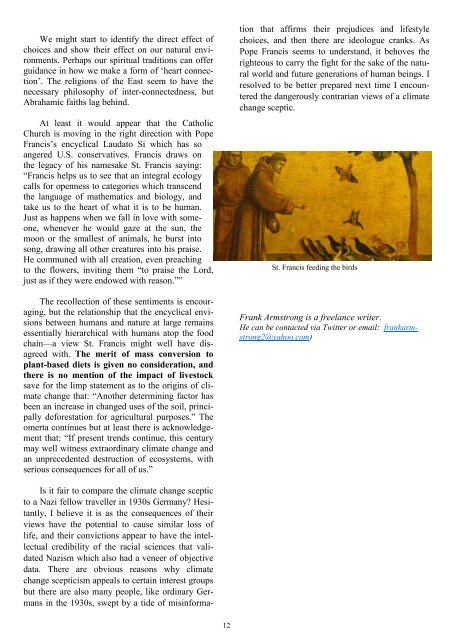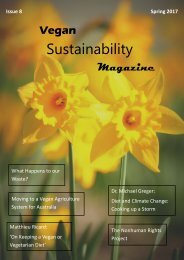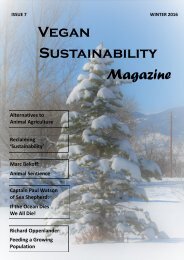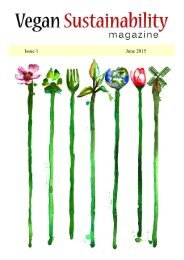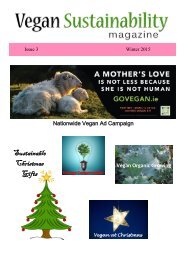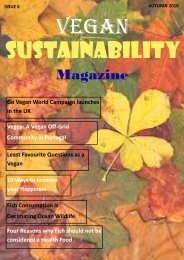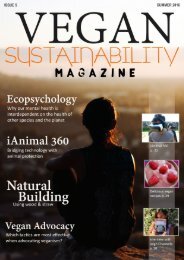Vegan Sustainability Magazine - Autumn 2015
A free, online, quarterly magazine for vegans and non-vegans worldwide who are interested in the environment and sustainability.
A free, online, quarterly magazine for vegans and non-vegans worldwide who are interested in the environment and sustainability.
You also want an ePaper? Increase the reach of your titles
YUMPU automatically turns print PDFs into web optimized ePapers that Google loves.
We might start to identify the direct effect of<br />
choices and show their effect on our natural environments.<br />
Perhaps our spiritual traditions can offer<br />
guidance in how we make a form of ‘heart connection’.<br />
The religions of the East seem to have the<br />
necessary philosophy of inter-connectedness, but<br />
Abrahamic faiths lag behind.<br />
At least it would appear that the Catholic<br />
Church is moving in the right direction with Pope<br />
Francis’s encyclical Laudato Si which has so<br />
angered U.S. conservatives. Francis draws on<br />
the legacy of his namesake St. Francis saying:<br />
“Francis helps us to see that an integral ecology<br />
calls for openness to categories which transcend<br />
the language of mathematics and biology, and<br />
take us to the heart of what it is to be human.<br />
Just as happens when we fall in love with someone,<br />
whenever he would gaze at the sun, the<br />
moon or the smallest of animals, he burst into<br />
song, drawing all other creatures into his praise.<br />
He communed with all creation, even preaching<br />
to the flowers, inviting them “to praise the Lord,<br />
just as if they were endowed with reason.””<br />
The recollection of these sentiments is encouraging,<br />
but the relationship that the encyclical envisions<br />
between humans and nature at large remains<br />
essentially hierarchical with humans atop the food<br />
chain—a view St. Francis might well have disagreed<br />
with. The merit of mass conversion to<br />
plant-based diets is given no consideration, and<br />
there is no mention of the impact of livestock<br />
save for the limp statement as to the origins of climate<br />
change that: “Another determining factor has<br />
been an increase in changed uses of the soil, principally<br />
deforestation for agricultural purposes.” The<br />
omerta continues but at least there is acknowledgement<br />
that: “If present trends continue, this century<br />
may well witness extraordinary climate change and<br />
an unprecedented destruction of ecosystems, with<br />
serious consequences for all of us.”<br />
Is it fair to compare the climate change sceptic<br />
to a Nazi fellow traveller in 1930s Germany? Hesitantly,<br />
I believe it is as the consequences of their<br />
views have the potential to cause similar loss of<br />
life, and their convictions appear to have the intellectual<br />
credibility of the racial sciences that validated<br />
Nazism which also had a veneer of objective<br />
data. There are obvious reasons why climate<br />
change scepticism appeals to certain interest groups<br />
but there are also many people, like ordinary Germans<br />
in the 1930s, swept by a tide of misinformation<br />
that affirms their prejudices and lifestyle<br />
choices, and then there are ideologue cranks. As<br />
Pope Francis seems to understand, it behoves the<br />
righteous to carry the fight for the sake of the natural<br />
world and future generations of human beings. I<br />
resolved to be better prepared next time I encountered<br />
the dangerously contrarian views of a climate<br />
change sceptic.<br />
St. Francis feeding the birds<br />
Frank Armstrong is a freelance writer.<br />
He can be contacted via Twitter or email: frankarmstrong2@yahoo.com)<br />
12


